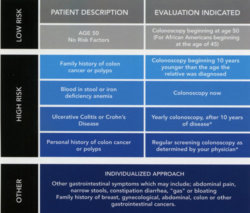
Before you begin to worry about colon cancer, let us see if you might be at risk. There really aren’t any physical symptoms to look for so you need to consider your risk factors and make sure that you have a colonoscopy at intervals suggested to you by your gastroenterologist. Remember, this list merely points out common risk factors and you should talk with a gastroenterologist at the GI Associates Clinic to find out if you are really at risk. If you have concerns about making an appointment, find out what to expect on your first visit.
- Colorectal cancer is more common in men and women over the age of 40 and that risk doubles after you reach 50. Men tend to develop more polyps than women, and there is a higher risk of those polyps developing into colorectal cancer.
- Having a family history of polyps in the colon puts you at a higher risk.
- Having an inflammatory bowel disease like ulcerative colitis can also put you at risk.
- If your diet is high in fat and low in fiber you may be at risk, or if your diet is high in smoked and salt or nitrite-cured foods.
- Heavy drinkers seem to be more at risk, and this risk increases if you are a smoker as well. Smoking increases the risk of various gastrointestinal cancers including stomach cancer and pancreatic cancer and smokeless tobacco increases the risk of cancer of the mouth, throat, and esophagus.
- Being overweight and/or sedentary puts you at a higher risk.
Polyps
During your colonoscopy, or any other colon cancer screening test, the gastroenterologist looks for polyps. A polyp is an abnormal growth that forms on the inner walls of the colon and sticks out into the colon passageway. They can range in size and quantity and can grow anywhere in the colon. The most commonplace for polyps to grow is the lower part of the colon. If there is a polyp found and it needs to be removed, it will be done during outpatient surgery. Most of the polyps found are not cancerous, however, they may be classified as precancerous. Polyp removal is an important tool in preventing colon cancer.
There are four main kinds of colon cancer screening tests:
- Digital Rectal Exam should be done every year after the age of 40.
- Stool Blood Test should be done every year after the age of 40.
- Proctosigmoidoscopy (when a gastroenterologist inspects the wall of the colon with a lighted tube) should be done every year, but the exams can be done every 3-5 years if you have 2 normal exams.
- Colonoscopy when your gastroenterologist recommends or at least by the age of 50.
Pancreatic cancer is another gastrointestinal cancer, though it is not talked about as often. Early detection is necessary for the best treatment outcome and the treatment options range from surgery, radiation, chemotherapy, or medication. Gastrointestinal specialists are making progress in understanding more about pancreatic cancer and how to treat it. The symptoms of pancreatic cancer mimic those of other illnesses making it hard to detect but research has shown that chronic alcoholism and smoking can potentially lead to pancreatic cancer. The best advice is to make an appointment at the GI Associates Clinic to see if you are at risk.
